Slowdive’s first extensive interview since their split in 1995
Daniel Dylan Wray meets Slowdive at Primavera Sound
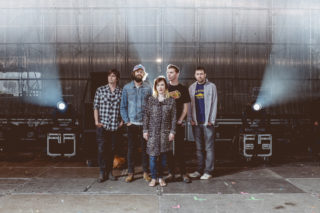
Daniel Dylan Wray meets Slowdive at Primavera Sound
In the build up to my interview time with Slowdive I sit watching John Grant perform. The sky begins to shift into looming black and grey patches, which soon transform into total blanket coverage of black, ominous dread. Shattering forks of lightning spark in the sky and then thunder rumbles with such shuddering force it sounds like an angry giant has been awoken in the heavens. Within minutes, a festival that only moments earlier was soaked in beaming sunlight is being clattered with biblical rain. John Grant sadly loses half his audience as people run for shelter and it is here that I duck backstage to meet the newly reformed band that originated from Reading in 1989.
In the series of cabins that make up the dressing rooms and backstage areas of Primavera Sound, all that can be heard is the unrelenting thud and hammer of rain on the thin roofs and the quiet hum of last month’s Loud And Quiet front cover artist on the distant stage. The weather seems bizarrely fitting, as, for me, Slowdive’s music has always had such an elemental force to it. While it may not be this kind of black-sky-end-of-days style weather, there has certainly always been a cloudiness to their work, an atmospheric ambiguity and fogginess that fluctuates in tensions and densities leaving one never really knowing if they are about to experience a break in the clouds or witness them fall in on you. With Slowdive’s return to playing live again, that question and elemental feeling is as relevant as ever.
It’s almost twenty years since Slowdive released any material, 1995’s monstrously overlooked and underappreciated ‘Pygmalion’, an album that was essentially their resignation letter – handed-in crammed full of electronic loops, transcendental tectonic shifts and eerie, lucid ambience, this was done knowing full well that it would not meet the requirements of label boss Alan McGee, who had supposedly demanded a pop-hit from the group. Sure enough it did the job. The band were dropped after three LP’s on Creation and have not performed or released any material as Slowdive since. ‘Pygmalion’ was never even heard live outside of their practice space.
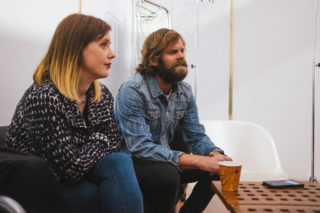
Tonight is their fourth show since reforming but it is unquestionably their biggest one yet, their grand return to their biggest audience. Sitting down with founders Neil Halstead and Rachel Goswell they both concede, “we’re all a bit anxious”.
The biggest question of any reunion after so long is always why? In 2009 Halstead told Drowned in Sound when asked about the possibility of a future Slowdive reunion happening: “I doubt it. I would really have to need some money!” So, has that day finally come? “That day has definitely come,” he says, laughing. “I don’t know if we’ll make that much… to be completely honest, it’s something we’ve wanted to do and we wanted to make a new record so the gigs were just part of the plan to do that really.” In fact Halstead is keen to point out that Slowdive are not likely to become yet another reformed band living off twenty-year-old material. “It’s the heritage industry,” he says. “It’s kind of a shame. It just seems very hard as an industry, the bottom has fallen out of it so much.”
The duration of their absence has been so great since the group last got together and played music that Halstead had to use a website called Guitar-Geek to look up what his guitar and pedal set-up used to be, in order to try and recreate the group’s sound. Tonight it will be a sound that the band has allowed their audience to dictate to them, somewhat. As Goswell tells me: “It’s a bit of a mix. Some stuff is taken from sets we used to play and we did ask people on Twitter what their favourite tracks were and took note of that.”
“It feels like natural selection to me,” adds Halstead. “It feels like we’re playing the stronger material from the records. It would be nice to play some more stuff from ‘Pygmalion’ but…
“…We need more time to work on it,” says Goswell. “It will take us a while. We’ll get there, though.”
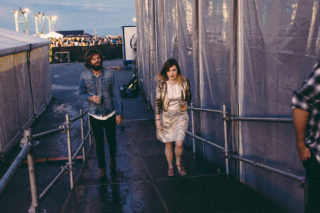
While the return of Slowdive has been greeted euphorically by fans and press, seeing their summer gig schedule fill up swiftly, they weren’t always welcomed with such open arms. In the early 1990s with new musical genres on the rise, the press took a universal backlash against Shoegaze, a scene that Slowdive were thrown into whether they liked it or not, and journalists took it in turns to come up with the harshest putdowns for the group. Writing about ‘Souvlaki’ – an album now held up as something of a masterpiece – Dave Simpson, then of Melody Maker, wrote: “At its worst, this record is a soulless void, devoid of pain, anger, feeling or concern. ‘Sing’ aside, I would rather drown choking in a bath full of porridge than ever listen to it again.” He was not alone in his criticism, although looking back on this side of things Halstead is characteristically relaxed and indifferent. “Personally I don’t really care,” he says. “I think we got caught up in it. A lot of the stuff wasn’t directed at us, it was directed at a scene that had kind of had its day. We got eaten up by Grunge and we got eaten up by Britpop. When I was a kid you used to buy the NME, Melody Maker and Sounds. You’d read the reviews and you’d go out and buy a record because that was your source and it’s not like that now – you end up with a much more direct relationship with people that buy your music. It’s a different set-up now and I don’t think any of us are interested in mainstream press really, in the same way that we were at the time.”
Slowdive were incredibly young back then, still teenagers, and with twenty years of gestation time I wonder if their youth and naivety can now be viewed as a blessing or a curse?
“You don’t remain naive for very long in that industry,” says Goswell, although Halstead’s opinion differs. “I think we did, though. We were very naïve in a business sense and probably musically as well and we didn’t really understand how the business worked. We signed to Creation, which was our favourite label. To be fair we all really enjoyed it. It was a really amazing experience to be able to do those things and tour America when you were eighteen years old. I know a lot of emphasis has been placed on the fact that the press didn’t really get it but I don’t know how much that affected our own personal enjoyment of it. We did genuinely enjoy it and we did genuinely enjoy making the records and going out and doing the gigs. That was our world, the press thing was outside of it; we didn’t really have anything to do with it, it just happened around us.”
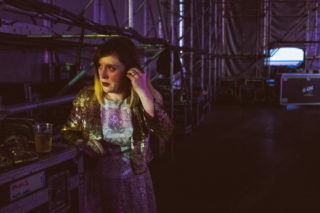
I ask if there are any feelings of vindication now?
“It would obviously be disappointing if you made a record and not that it gets a bad review but that it just doesn’t get appraised in anyway, just that it’s like, ‘oh, this is part of this scene and we don’t really like that,’” says Halstead. “But there were still kids out there who liked the records and if there is any vindication then it’s that there are still kids out there that want to listen to the music now.”
“I think business-wise it was a curse,” says Goswell, to elaborate on the band’s naivety when it came to business matters. “In a band when you get signed you are told all these things that you have to have – a manager, an accountant etc. We were made bankrupt, we had a lot of problems due to an accountant who did ultimately end up in prison, and he was sued by a lot of bands, a lot of bigger bands, so we were very naïve in that sense and that side of things was very difficult and that sort of ricocheted around for years after we split up. So I would say from that point of view it was definitely a curse being young and naïve. We were too trusting, believing that people had our best interests at heart when actually they didn’t and obviously twenty years later we’re all a lot more savvy.”
“At the time as a band we were just literally interested in making the music and we had a manager who dealt with everything else,” says Halstead. “It wasn’t really until the band split up that we realised, ‘oh fuck, all that shit he was supposed to be taking care of he really didn’t.’ It happens in all walks of life though, doesn’t it? It’s not just music.”
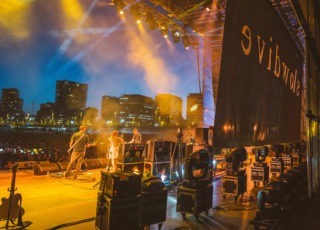
The music industry in 1994 compared to 2014’s is of course infinitely different, and something that Halstead is certainly aware of. “It’s [the industry] a weird, strange beast,” he says. “Especially at that time I think it was. Now that the music industry has eaten itself and it’s a different kind of world I, in some ways, miss the sort of irresponsibility of that period in music because it was like bands would be signed for fifty grand and told to go and do some demos and be forgotten about for two years and then someone in accounts would be like ‘hang on a minute, didn’t we give fifty grand to some band like two years ago?’. That doesn’t happen anymore and there was something quite nice about that in some ways. Now everything is very responsible and now as a band you have to be able to completely look after yourself musically, financially, you have to have all the social network stuff. You have to do everything. It’s crazy. You’ll have promoters emailing you saying, ‘can you promote the show a bit more on your Facebook’, and I’m like, ‘that’s your fucking job!’ But now it’s up to the bands to do everything. They are not allowed to be irresponsible anymore, which is sort of a shame. We were basically irresponsible because we didn’t take care of the business ourselves and that did allow us to make the records we wanted to make.”
Of all the labels to be young and irresponsible on, Creation during the ’90s was the perfect home – a label as notorious for its partying as it was its musical output. However, Slowdive were on the verge, compared to Primal Scream and Ride. Goswell points out that they didn’t live in London, while Halstead recalls how young they were. “We always felt like the kids who were up a bit late because everyone was so much older than us,” he says. “I remember McGee taking us to the Hacienda with Bobby Gillespie. It was about a week after we signed to Creation and we did a gig in Manchester and I just sat down and it was a bit like hanging out with your parents because these guys were like twenty years older than us. That’s how it felt, so I don’t remember going to a party at Creation. We would always turn up and be slightly aware that a party had been going on.”
“Yeah you would arrive like that,” says Goswell. “I remember Teenage Fanclub still being there the morning after being wasted the night before. I remember going to see Primal Scream with McGee and he was dishing out E’s.”
“You probably shouldn’t say that,” says Halstead, at which point I explain that I have previously interviewed Alan McGee and I don’t think for one second he would have any issues or sense of denial when it comes to his drug-use being discussed in public.
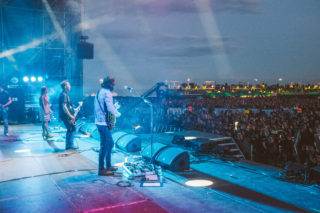
Their relationship with the label wasn’t always as fraught as is often documented, though. “We would always go into the studio and the record company would never come,” says Halstead. “We’d just make the records and give them to Creation. Other than on one occasion when we gave Alan half a record and he was just like, ‘no, I think you guys should make some other stuff’, every other time we’d just give them the record and they’d say ‘cool’ and they’d put it out.”
Talk turns back to the future and the now, with the band about an hour away from taking to the stage. They’ve expressed plans for new material, too, so what, exactly, does the future hold for Slowdive?
“We’re going to get through the summer and play these shows and see how we go,” says Halstead. “The thing with Slowdive is that it’s always very organic; there has never really been a plan and I can never see that changing at this point. I think if we get to the end of the summer and feel like we have some ideas and it feels like a creative enterprise worth doing then we’ll move forward and try recording something. I’m not sure how Slowdive MK II will work, I guess we’ll have to figure it out.”
I stand side of stage to wait to see how Slowdive MK II will work. As the simple banner with the band’s name rolls down on stage the crowd erupts. Brian Eno’s (a collaborator on ‘Souvlaki’) ‘Deep Blue Day’ plays as warm-up music, a gentle swirling of glistening euphoria fills the air and Daniel Lanois’ pedal steel guitar glides seamlessly through the now muggy and calm evening. The band ascend the ramp, walk on under heavy purple lighting and play their first ever song from their first EP, ‘Slowdive’. Halstead and Goswell’s voices merge and entangle like estranged friends. It’s a harmonious melding that, when boosted by guitars that sound like underwater chainsaws and drums that thunder and clatter with surprising clout, sounds as forceful as it does withheld.
During ‘When the Sun Hits’, ‘Machine Gun’ and the incredible ‘Crazy for You’, out in the vast audience heads are in hands, arms are aloft, eyes are wide and manic euphoria is on the faces of people who have, in some cases, been waiting a lifetime to hear this music performed live. Goswell tells the audience “This has been very special for us” as they close with a longstanding, screeching Syd Barrett cover of ‘Golden Hair’. And like the freak flash-flood weather earlier on, Slowdive are here and gone within the hour, leaving behind them a permeating, lingering atmosphere, which is unquestionably all their own.